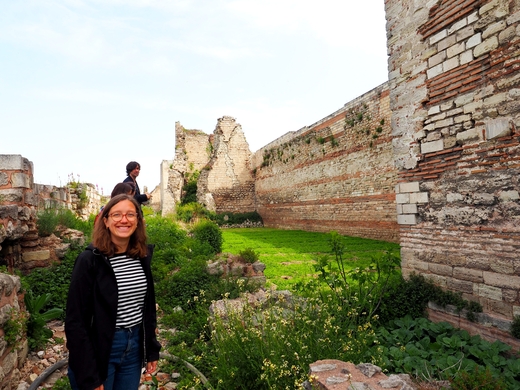Excursion to Istanbul
03.05.2019
From May 3 to 5, 2019, a group of 11 Environmental Studies Certificate students went on an excursion to Istanbul to visit the city’s historic urban gardens. The gardens are currently under threat due to overconstruction and speculations.
With more than 15 million inhabitants—not counting the unregistered ones—the city of Istanbul is ever growing and spreading into the surrounding areas. Every space left in the city is used to build and construct parking lots, shopping malls, and other new high-rise projects. The historic market gardens, called bostans, which date back to the 16th century, are under threat due to these changes in the city’s landscape. Bostans can be described as small gardens or orchards, usually not more than four to five acres in size and are usually tended by a single family.
Construction sites are part of Istanbul's landscape
During the trip, the students had the chance to visit several historic gardens in the central neighborhoods of Yedikule and Piyale Paşa, but also outside the city and along the Bosporus. Some belong to mosque complexes or are part of the UNESCO protected Theodosian city walls of former Constantinople. Speaking with politicians, members of the association of gardeners, journalists, and activists, the bostan gardens were not only visited by students but connected with faces and stories of those involved in the struggle to preserve them. Along the way, students presented the readings they had done in preparation for the course, which provided additional facts to the places visited.
Students get the chance to work in the gardens
Aside from sharing knowledge, the students also had the chance to see the farming practices passed on from generation to generation. These techniques included how the watering system with the wells and cisterns work, how the fields are created, and how seeds are obtained and planted. Students were even able to put this new knowledge into practice in the bostans by creating a new patch for a vegetable field.
The students speak with Aleksandar Shopov (Ottoman historian) and Gülay Yedekçi (former member of parliament and university professor)
Urban farming and gardening practices are increasingly discussed worldwide as a development toward a more sustainable future. Locally grown food, green spaces, and places of social interaction— and many more facets—make these projects attractive. Istanbul's bostans are unique in the world because of their many centuries-long tradition and they show how sustainable city usage is possible The workshop discussed several questions, looking at the bostans from different disciplines.
• How can we study the history of the soil in the city and those who till it?
• How have practices and models of urban farming changed over the centuries?
• How do different cities structure the relationships between people, built environments, plants, and water?
• What are the boundaries between the urban and the agrarian?
• What are the political and economic forces that create or destroy farming spaces in the city?
• How can urban farming benefit the many and not the few?

Students take a walk along the Theodosian city walls and the connected bostans
The bostans are a part of Istanbul's rich history and help to preserve it. The excursion has been a unique experience for everyone involved, as the practices in the bostans could be experienced firsthand. As the future of the historic gardens remains unclear, it might have been one of the last chances to visit the bostans and study the historic farming practices.

